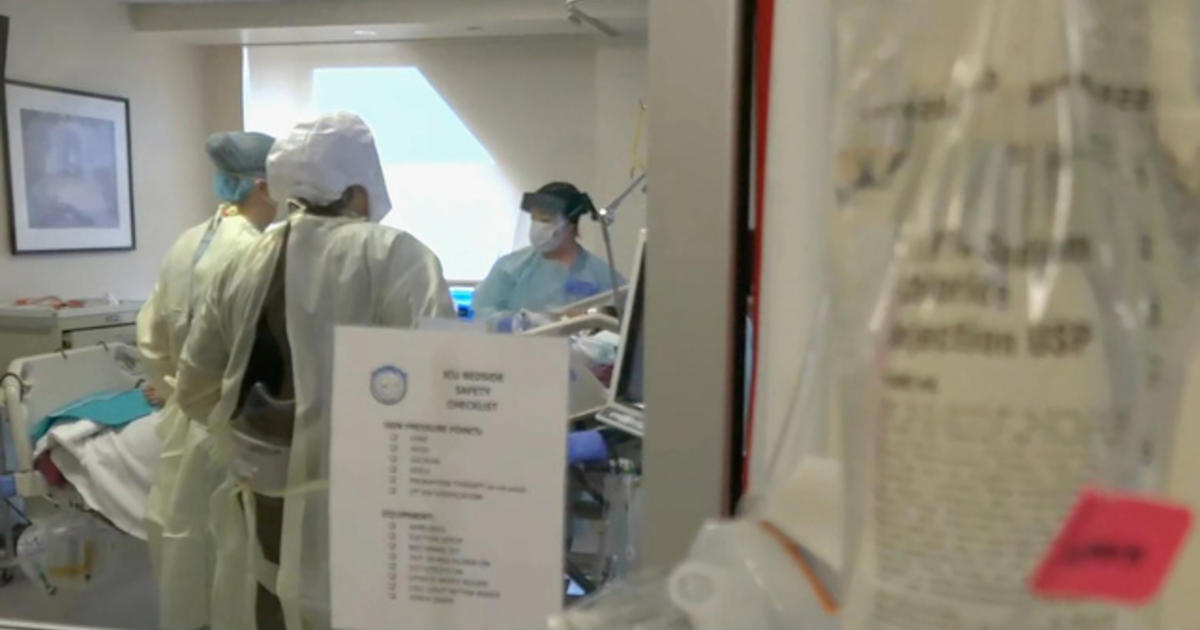
As the race to vaccinate Americans against COVID-19 is accelerating, 32 states have now detected variants of the coronavirus first found in the United Kingdom, Brazil and South Africa – putting even more pressure on the vaccination push, and on hospitals.
In Los Angeles, officials are worried about two confirmed cases in the city of the more contagious U.K. strain. They're worried because L.A. was one of the hardest-hit communities in the entire country even before there was talk of variants, reports CBS News lead national correspondent David Begnaud.
In the East L.A. community of Boyle Heights, a section that's nearly 90 percent Latino, the average daily coronavirus-related death rate among Latinos soared more than 1,000% since November.
At Adventist Health White Memorial Hospital, one of L.A.'s hardest-hit, there are now active duty military personnel working alongside civilian nurses trying to save lives.
"The most difficult thing is knowing that we're caring for a patient that may not make it, even given all the best efforts," said nurse Wesley Willard, the ICU manager at White Memorial.
On his staff of more than 120 is 1st Lt. Lana Bagwell, R.N., U.S. Air Force. "The strengths that these nurses and these health care professionals have to do this, day in and day out, is amazing to me," she said.
Bagwell is one of the roughly 20 medical personnel sent by the Department of Defense as reinforcements to hold the line against the invisible enemy. She's been here on the front line for three weeks.
Begnaud asked Willard, "How much time would you normally give someone to orient?"
"With a new employee with experience? We'd probably do four weeks with everything," he replied.
"And you got a shift-and-a-half, because time was of the essence?" he asked Bagwell.
"Yes – time was of the essence," Willard said.
Adventist Health sits right in the middle of Boyle Heights. Willard said socioeconomic conditions played a role in it being one of the city's hardest-hit neighborhoods – about a third of all families here make less than $25,000 a year.
"They have multiple families living in one home," said Willard. "They're not able to socially distance. Some of the stories that I've read, the backgrounds of the patients, they're the sole breadwinners and they still have to go to work. And it's so unfortunate."
"This is in many ways ground zero?' asked Begnaud.
"Absolutely."
Willard himself is a West Point graduate and a former Army captain, who served active duty for five years, including one tour in Iraq.
Begnaud asked, "Given what you've seen in a war zone, how does this compare?"
"I think there's a lot of similarities," Willard replied, "in the ability of our nurses to pull through, have that teamwork mentality, just like my soldiers did."
Bagwell said, "I felt tremendous pressure because I didn't want to drop the ball. So, I felt tremendous pressure to come in, learn everything I could, and really integrate myself and become part of the team. And I think we accomplished that."
Also on the front lines, Adventist Health is launching a community vaccination effort next week, because many people here do not have internet access and don't know where to sign up for shots.
There are similar issues in underserved communities around the country. For example, in New York City, 24 percent of the population is Black and 30 percent is Latino, yet they account for only 11 and 15 percent, respectively, of vaccinations received. In New Jersey, it's even lower; with 15 percent Black and 20 percent Latino population, they only account for three and five percent, respectively, of those vaccinated.
So, in Boyle Heights, they will begin bringing vaccine doses door-to-door.
See also:
February 02, 2021
https://www.cbsnews.com/news/us-military-aids-hospitals-hit-hard-covid-19/
U.S. military comes to the aid of hospitals hit hard by COVID-19 - CBS News
https://news.google.com/search?q=hard&hl=en-US&gl=US&ceid=US:en
No comments:
Post a Comment